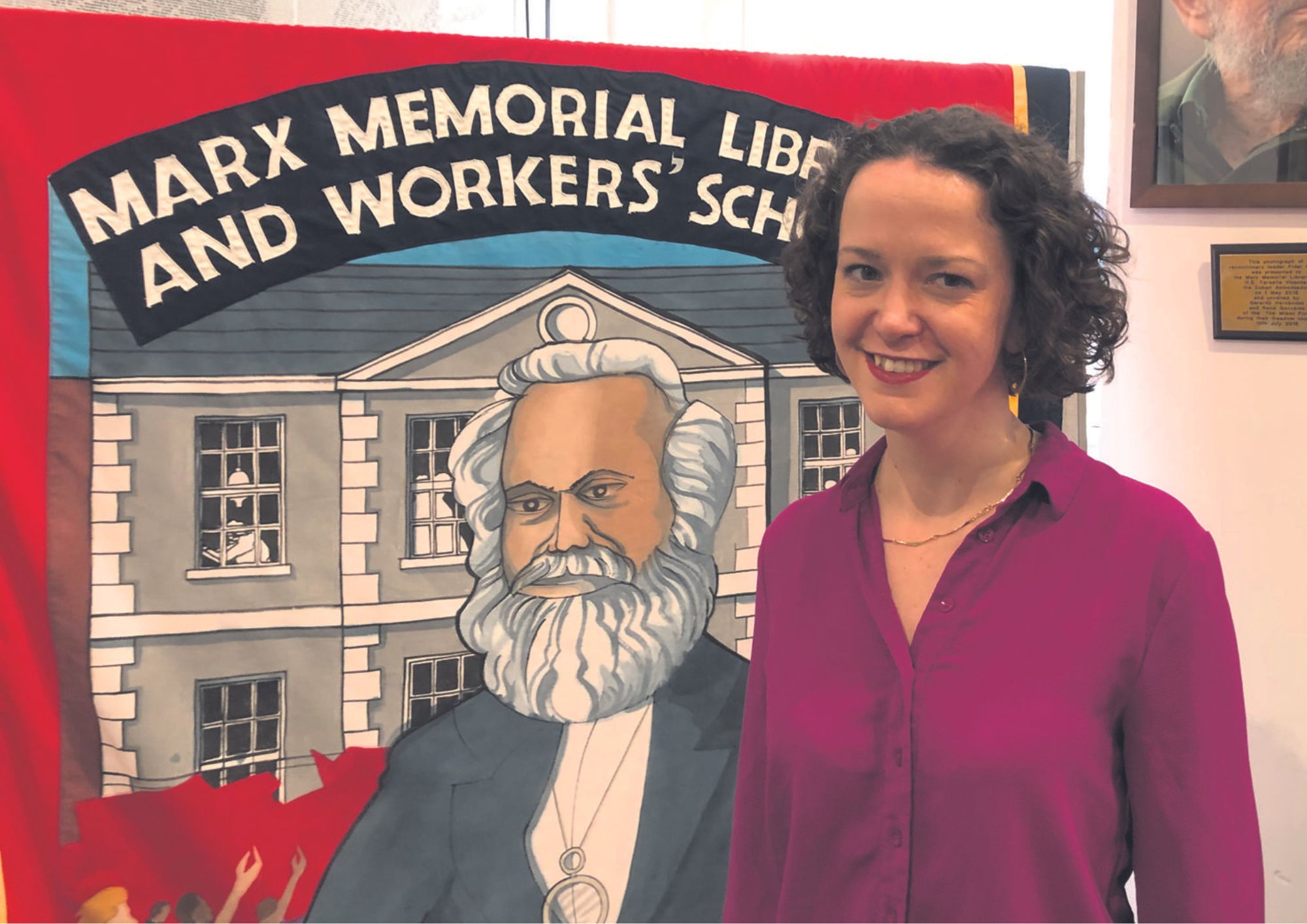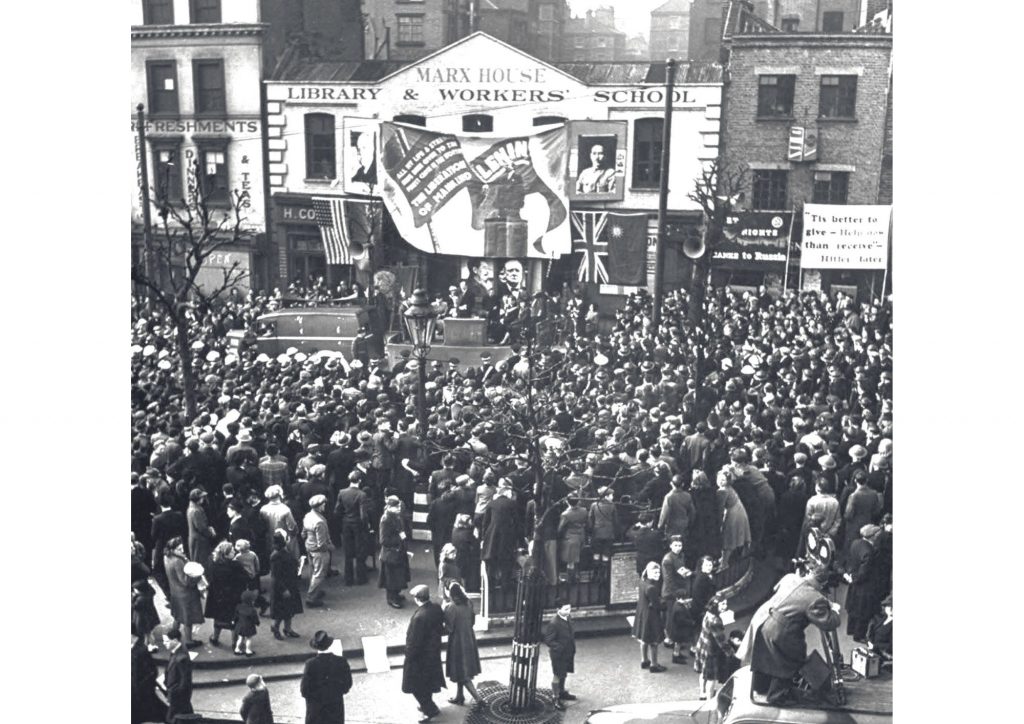May Day: The library on our doorsteps which has always been a hub for radical activity
People will gather for May Day march in Clerkenwell Green
Monday, 1st May 2023 — By Dan Carrier

Meirian Jump at the Marx Memorial Library in Clerkenwell
IT is a tradition stretching back 133 years – and this Monday the annual May Day march will gather on Clerkenwell Green before embarking on a cross-city march to Trafalgar Square.
Since 1890, workers, trade unionists, socialists and all manner of other progressive causes have met to mark this special day – and this year,
The Marx Memorial Library, on whose steps the parade gathers, throws open the doors to its 90-year-old institute for visitors to explore its globally unique archives and resources.
They range from the desk where Lenin edited the revolutionary newspaper, The Spark, to Marx’s cigar box.
“May Day is the perfect opportunity to invite people in to explore this historic building,” says director and archivist Meirian Jump.
The library, which is open for visitors throughout the week, hosts a celebration for the date that has become synonymous with workers’ rights, including displays on working-class history and a bookshop.
And as the library reaches its 90th birthday this year, May Day is a time also to look back at its history – and as Ms Jump reveals, how relevant the history of the working class, politics, culture and the fight for equality resonates so loudly today.
The library was officially founded in March 1933 by the Marx Commemoration Committee, explains Ms Jump.
“It was the 50th anniversary of the philosopher’s death, and a wide range of groups and movements got together to discuss how this should be marked,” she says.
The meeting, at Conway Hall in Holborn, brought together members of the Labour movement, the trade unions and other groups.
“This was set against the rise of fascism in Europe,” explains Ms Jump. “There was this frightening political backdrop to the meeting.”
A member of the National Union of Railwaymen suggested a library would be a fitting memorial to Marx with the concurrent aim of focusing on education and discussion – and it was made more pertinent following events in Nazi Germany that year.
“There had been big gatherings of book burning in Germany,” adds Ms Jump.
“It was decided a socialist library, which also included classes for workers, was a way of commemorating Marx and educating people about socialism and equality.”

The 90-year-old library has held classes for workers, educating people about socialism and equality – as well as commemorating Marx
The Clerkenwell site – a school for Welsh Artisan Children that opened in 1738 – was chosen. Paid for by artist and poet Clive Branson and his partner, the activist Nora Branson, it had historic links to left-wing politics. It had been the home to the Social Democratic Federation and their printing press, called the 20th Century Press.
“The building was the ideal place because of its radical history,” says Ms Jump.
“In the 1890s and 1900s English language socialist pamphlets and other publications were printed on site and distributed across the country, dealing with contemporary political issues and offering talking points for the readers to discuss.
“It has always been a hub for radical activity.”
Its credentials were further boosted by the fact Lenin worked there, editing The Spark, which would then be smuggled into Russia.
“We have tourists from all over the world visiting,” Ms Jump says. The library had a special role to play during the Second World War.
“During the war, the library printed anddistributed lots of anti-fascist publications, promoted lots of educational work such as study circles across the country to rally people to fight Nazism.
“They had lectures every weekend and in the evenings so workers could join in, and they discussed topics you will hear still being discussed today – prices and profits, fair pay, housing, and on a wider international level, imperialism and freedom.”
Over the 90 years, the library has accumulated a vast range of materials. These include over 55,000 books, pamphlets and periodicals, the archives of activists and revolutionaries such as the Anglo-American, Gospel Oak-based communist writer Claudia Jones, St Pancras industrial worker Wal Hannington, and the Irish socialist James Connolly.
They started with 1,500 books mainly on Marxist thought and history. Today, the collection includes a unique archive telling the story of the International Brigades – the brave volunteers who travelled to Spain to fight fascism in 1936.
It includes diaries, letters, photographs and personal items from Brigadiers, such as a wallet with an ID card still inside.
“We have a range of materials, including the bullet-holed plaque on the side of an ambulance paid for by a collection from workers in Hammersmith,” she adds.
The artistic temperament and the importance of culture in the progressive movement is also clear, adds Ms Jump.
“We have collected amazing trade union banners, we have over 2,000 posters that range from Soviet imagery to the anti-Apartheid movement, and anti-imperialists across the world,” she explains.
And they are sought after: the ambassadors of Cuba, Nicaragua and Venezuela visited last week to gaze over objects linked to their countries’ liberation struggles.
Older elements of the collection go back to the Chartists, and includes eyewitness reports of the Peterloo Massacre.
The library remains a unique resource for study, and its relevance today cannot be understated. The archives are being digitised, while schools and colleges have come to learn about the people who fought for a better world.
“We have work on the fight against racism, about women’s liberation, refugees, freedom, imperialism and war – topics that are really relevant today,” she adds.
They range from sixth-formers doing a project on the black International Brigader Charlie Hutchison from Hammersmith, who fought in Spain, while fashion undergraduates from Central St Martins recently visited to learn about the garment unions and the tailoring trade – and discovered how for many, the working practices of the schleppers – those who did piecemeal tailoring work in their homes – resonates with today’s fast fashion industry.
A visit to the library in politically dark times can inspire, adds Ms Jump.
“Coming here can make you feel resilient,” she explains.
“If you know your history, the triumphs and failures, it gives you a sense of being in a much longer trajectory.
“When you look at labour history and the progressive struggles people faced, it is empowering. People can transform their society when they act collectively. Look at what was considered normal at the start of the 20th century, for example, and see how society has been transformed since then.
You can draw parallels with today, and knowing you are standing on the shoulders of previous progressives educates, enthuses and rallies you to make the change you want to see.”
And the library remains an agent for radical change.
“The founders were really ambitious,” she adds. “It was all about education, and growing a movement. They saw the library as the beginning.”
More info: https://www.marx-memorial-library.org.uk/
SEE ALSO CNJ’S BIRTHDAY – SUPPORT CAMPAIGNING JOURNALISM


